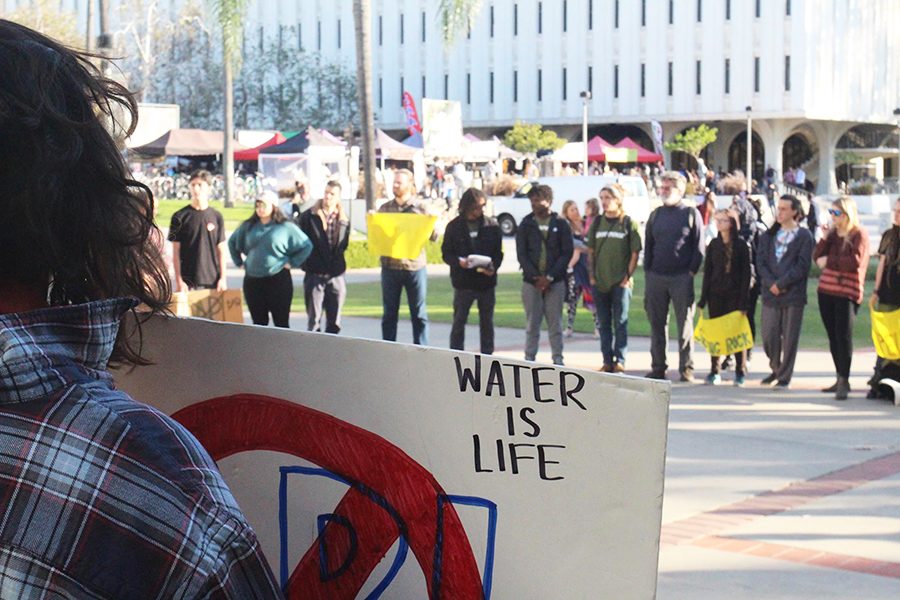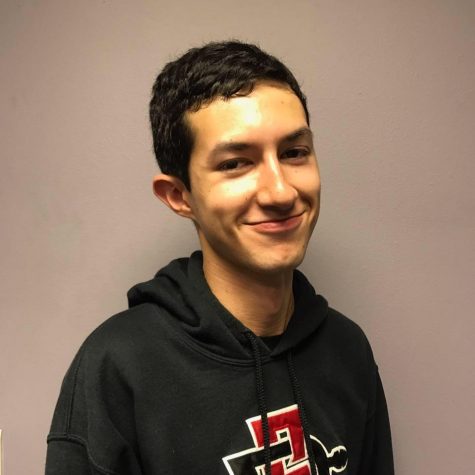Before the United States Army Corps of Engineers denied use of federal land for the unfinished section of the Dakota Access Pipeline, dozens of people gathered at San Diego State on Thursday, Dec. 1 to protest the project.
Demonstrators formed a circle in front of Hepner Hall Thursday afternoon before marching around campus to chants of “Water is life,” and “Can’t drink oil, keep it in the soil.”
“It’s a pretty tragic thing that’s been happening,” said Shelah Ott, who chairs Associated Students’ Green Love and Sustainability initiative and helped organize the protest, said.
“Aside from the obvious environmental damage that it poses to water sources, the construction of the pipeline actually desecrates native ancestral burial lands and sacred lands,” she said.
Ozzy Monge, an American Indian Studies lecturer at the demonstration said this issue is more than just a pipeline struggle.
“It’s really emblematic of the struggle of indigenous peoples since the arrival of Columbus, I guess, if you want to go back that far,” Monge said.
“The real issue isn’t so much the pipeline as it is about land and social justice and sovereignty,” he said.
The pipeline, which is nearly complete, runs close to North Dakota’s Standing Rock Indian Reservation and directly through 38 miles of territory claimed by the Sioux tribe under the Fort Laramie Treaty of 1851, although the land was later taken from the tribe.
The sole unfinished section, prior to the Army’s decision, would have run under a Missouri River reservoir that provides drinking water to the reservation.
In recent months, thousands of protesters have been camping at the site of the unfinished section to block its construction due to concerns about sacred lands, water contamination and the risk for oil spills and fires.
Thousands more have assembled throughout the country in places like SDSU to bring awareness to the Sioux tribe’s situation.
Actor and San Diego resident David Fernandez, Jr. said he had a “transcendent experience” at the North Dakota protest and wanted to show support for SDSU student protestors as well.
“I just came here to support my students,” he said. “I was in Standing Rock for a month and a half, and so they just asked me to come and support. I love the unity and I love the power of love and connection.”
English sophomore Lane Yazzie said he was present at the protest because as a member of the Diné tribe, the cause is important to him.
“I know that we have problems in different native communities and I feel like shining light on this issue and our community will shine light on the injustices my people face,” Yazzie said.
He said whatever economic benefits the pipeline may provide, it is not as important as the drinking water it could possibly affect.
“When it breaks, we can’t drink money,” Yazzie said. “We can’t drink oil. And that’s what’s consuming everyone is the money and the profit of oil. Water is life, and that’s what we need the most.”
On Dec. 4, the United States Army Corps of Engineers announced it would not grant an easement for the pipeline to cross under the Missouri River reservoir. They are preparing an Environmental Impact Statement for alternative routes.









